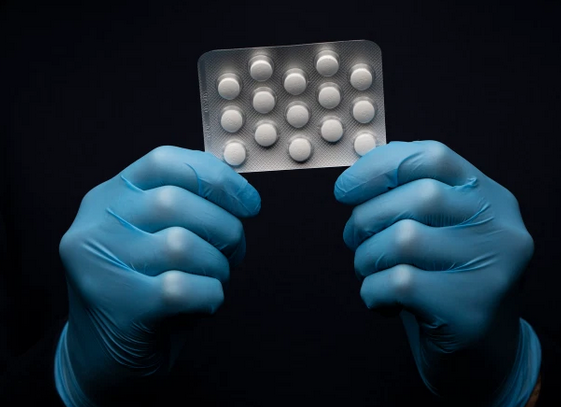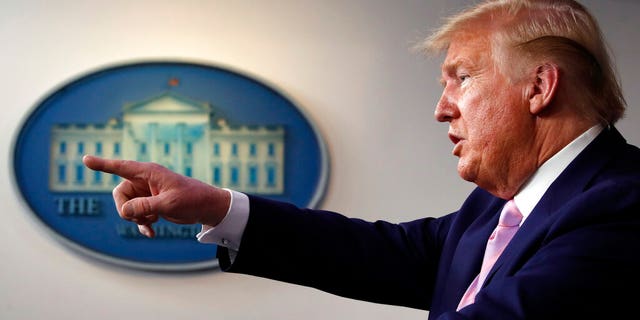
After repeatedly mocking President Trump for suggesting on March 19 that hydroxychloroquine could be an effective treatment for coronavirus, media organizations have begun acknowledging that the drug — now approved for emergency use to treat coronavirus by the Food and Drug Administration (FDA) — may be useful after all.
Journalists and top Democrats have beaten a similarly hasty retreat from their previous claims that Trump’s ban on travel from China was both xenophobic and ineffective. But media outlets’ misinformation on hydroxychloroquine was unique because it involved not simply policy disagreements but also suggestive medical advice and directives that could have dissuaded some from seeking certain treatments.
“Malaria Drug Helps Virus Patients Improve, in Small Study,” The New York Times reported this week, adding: “A group of moderately ill people were given hydroxychloroquine, which appeared to ease their symptoms quickly, but more research is needed.”
Michigan Gov. Gretchen Whitmer, a Democrat, went from threatening doctors who prescribed the drug with “administrative action” to requesting that the federal government ship her state some. Other state leaders have followed suit, including Nevada Gov. Steve Sisolak, also a Democrat.
It wasn’t always considered acceptable to use that kind of optimistic rhetoric, however.
“Trump peddles unsubstantiated hope in dark times,” read a March 20 “analysis” by CNN’s Stephen Collinson. Saying Trump was “adopting the audacity of false hope” and embracing “premature optimism,” Collinson charged that “there’s no doubt he overhyped the immediate prospects for the drug” because the FDA had not provided an explicit timeline on approving the drug to treat coronavirus.
In fact, at the March 19 White House briefing, Trump had remarked: “Now, a drug called chloroquine, and some people would add to it, hydroxychloroquine, so chloroquine or hydroxychloroquine … [has] shown very encouraging, very, very encouraging early results.” The president acknowledged that the drug may not “go as planned” and that more testing was needed, but that “we’re going to be able to make that drug available almost immediately.”
Nevertheless, the media onslaught continued. “Trump is giving people false hope of coronavirus cures. It’s all snake oil,” read one Washington Post headline. Added the Post’s editorial board: “Trump is spreading false hope for a virus cure — and that’s not the only damage.”
“The most promising answer to the pandemic will be a vaccine, and researchers are racing to develop one,” the paper insisted, although it is not staffed with medical experts. “Mr. Trump’s inappropriate hype has already led to hoarding of hydroxychloroquine and diverted supplies from people with other maladies who need it. His comments are raising false hopes. Rather than roll the dice on an unproven therapy, let’s deposit our trust in the scientists.”
USA Today’s editorial board was similarly aggressive and mocking, writing, “Coronavirus treatment: Dr. Donald Trump peddles snake oil and false hope.”
“There are no approved therapies or drugs to treat COVID-19 yet, but the president hypes preliminary chloroquine trials at White House briefing and unproven remedies on Twitter,” the paper wrote, just days before the FDA would approve the drug.
Communications strategist Drew Holden flagged these and numerous other examples of media misinformation on the matter in a lengthy Twitter thread.
Salon, Holden noted, called Trump’s hope in the new treatment his “most dangerous flim-flam: False hope and quack advice.”

President Donald Trump speaks about the coronavirus in the James Brady Press Briefing Room of the White House, Wednesday, April 1, 2020, in Washington. (AP Photo/Alex Brandon)
The New Yorker pondered “The Meaning of Donald Trump’s Coronavirus Quackery,” observing that Trump’s “pronouncements are a reminder, if one was needed, of his scorn for rigorous science, even amid the worst pandemic to hit the U.S. in a century.”
Michael Cohen, a Boston Globe columnist, urged networks to stop airing Trump’s coronavirus press briefings because he was spreading “misinformation” about a potential cure.
And, NBC News complained, “Trump, promoting unproven drug treatments, insults NBC reporter at coronavirus briefing.”
The New York Times’ Kurt Eichenwald reported that a “Louisiana MD” on the “front lines of the COVID-19 fight” had told him that “Hydroxychloroquine doesn’t work” and that “amateurs who dont [sic] understand research” were driving up demand for the drug. (“Count me skeptical of your source here, Kurt,” Holden wrote.)
Vox mocked Trump’s “new favorite treatment” for the drug, and said the evidence is “lacking” that it works.
Meanwhile, it has emerged that the Arizona woman who said she and her husband drank fish-tank cleaner to ward off coronavirus has donated heavily to Democrats and acknowledges she’s not a Trump supporter — despite news reports that she ingested the dangerous drug because she trusted what she thought was the president’s advice.
The 61-year-old woman, whose first name is Wanda but has asked for her full identity to be withheld, survived the ordeal. Her 68-year-old husband, Gary, did not. Wanda has said that she and her husband each took a “teaspoon” of the fish-tank cleaner; medical toxicology results and a police investigation were pending.
“I saw it sitting on the back shelf and thought, ‘Hey, isn’t that the stuff they’re talking about on TV?'” Wanda told NBC News, referring to the chloroquine phosphate in her fish-tank cleaner.
On March 19, Trump had touted anecdotal evidence that the antimalarial drug chloroquine could be used as a treatment for coronavirus during a White House briefing, calling it a possible “game-changer.” In fact, the Food and Drug Administration has approved the drug on an emergency basis, even though various media reports had mocked Trump’s suggestion.
However, the woman and her husband ingested the additive chloroquine phosphate, which has been used in aquariums to kill microscopic organisms that might harm fish and other aquatic animals.
Several media organizations that confused the chloroquine medication with chloroquine phosphate later issued corrections. The New York Times, though, all but accused Trump of recommending the same substance in the fish-tank cleaner.
Nevertheless, Wanda drew national attention by claiming that Trump had suggested she consume the fish-tank cleaner with her husband, and that she did so to avoid “getting sick.”
“My advice is don’t believe anything that the president says and his people because they don’t know what they’re talking about,” Wanda told NBC News’ Vaughn Hillyard.
Federal Election Commission (FEC) records reviewed by The Washington Free Beacon revealed numerous other recipients of Wanda’s cash, including Hillary Clinton, the Democratic Congressional Campaign Committee (DCCC) and the pro-choice EMILY’s List.
Additionally, Fox News has reviewed a Facebook page apparently belonging to Wanda, which was first identified by the Twitter user Techno Fog.
“Your psycho prez is in [t]own, are you going to see him?” Wanda wrote on Facebook on Feb. 19, by way of wishing a friend a happy birthday. Trump was in town at a rally in Phoenix, Ariz., on that day.
Wanda has not replied to multiple requests for comment by Fox News. She deleted her Facebook page after Fox News attempted to contact her there.
In the race to find a vaccine to combat the aggressive spread of the novel coronavirus, scientists with the University of Pittsburgh School of Medicine may have found a potential option.
With funding from the National Institute of Allergy and Infectious Diseases, the National Institute of Arthritis and Musculoskeletal and Skin Diseases and the National Cancer Institute, university scientists developed a candidate vaccine to fight against SARS-CoV-2, the virus that causes COVID-19. The team’s findings were reported Thursday in eBioMedicine, which is published by The Lancet.
The study is the first “to be published after critique from fellow scientists at outside institutions that describes a candidate vaccine for COVID-19,” according to a news release, which added: “The researchers were able to act quickly because they had already laid the groundwork during earlier coronavirus epidemics.”
“We had previous experience on SARS-CoV in 2003 and MERS-CoV in 2014. These two viruses, which are closely related to SARS-CoV-2, teach us that a particular protein, called a spike protein, is important for inducing immunity against the virus. We knew exactly where to fight this new virus,” said Andrea Gambotto, associate professor of surgery at the University of Pittsburgh School of Medicine and co-senior author of the study, in a statement.
Researchers used mice in the study, delivering the vaccine to them through a “fingertip-sized patch” that they claim “produces antibodies specific to SARS-CoV-2 at quantities thought to be sufficient for neutralizing the virus.” The mice began to develop antibodies against the novel virus two weeks after receiving the shot, according to the study.
Though the mice have not been monitored long term, the researchers said mice in vaccine trials for MERS-CoV “produced a sufficient level of antibodies to neutralize the virus for at least a year” and indicated the antibody levels in the mice apart of the new study “seem to be following the same trend.”
The researchers are now seeking investigational new drug approval from the U.S. Food and Drug Administration. If approved, they hope to begin clinical trials in humans “in the next few months.” However, such trials would likely take a year or longer before the next steps could be taken, they noted.
“Thus far, our studies suggest that it may now be possible to produce clinical-grade vaccines against novel pathogens for human testing and subsequent global distribution in time to significantly impact the spread of disease,” they said in the study.
Though promising, some experts have warned a COVID-19 vaccine of any kind is a ways away, with one former FDA official telling Fox News this week that it is likely “years away.”
“The 12-18 month estimate for a widely available vaccine is ‘happy talk’ from developers and politicians and amplified by the media,” Dr. Henry Miller, who is also a microbiologist, said.
